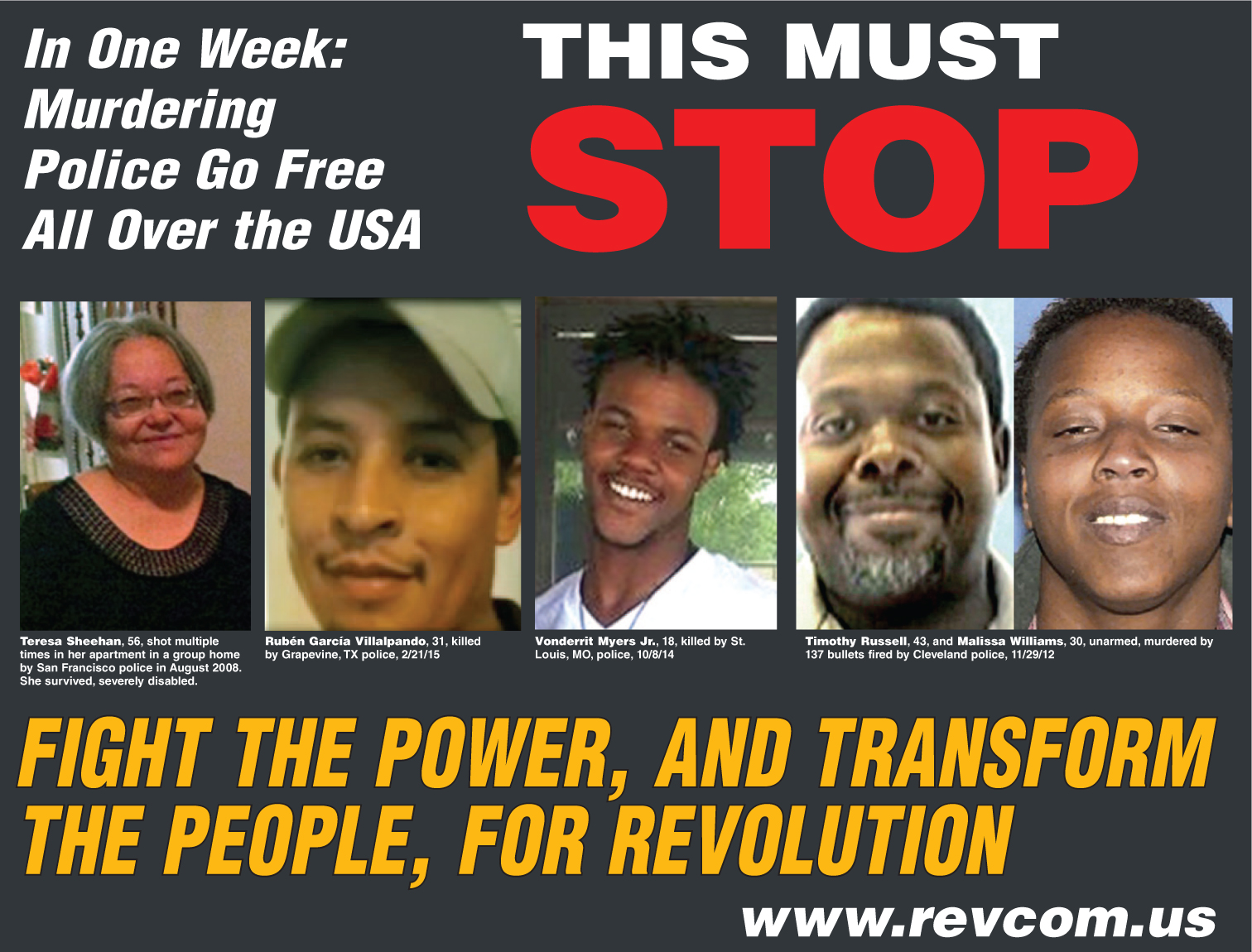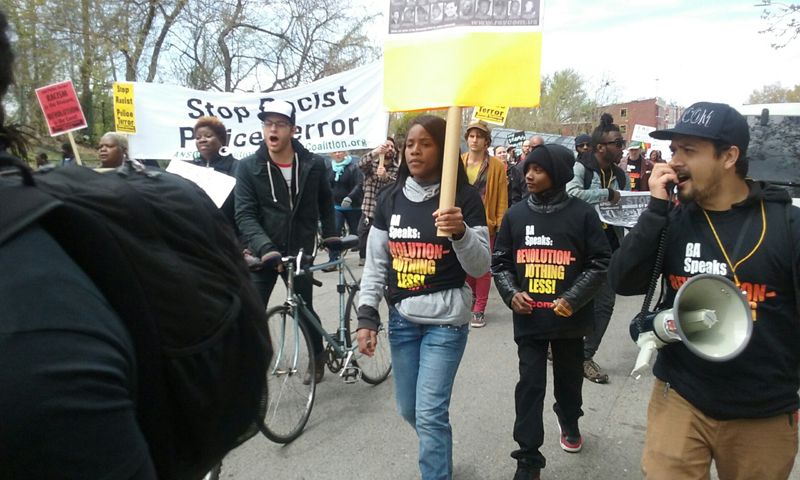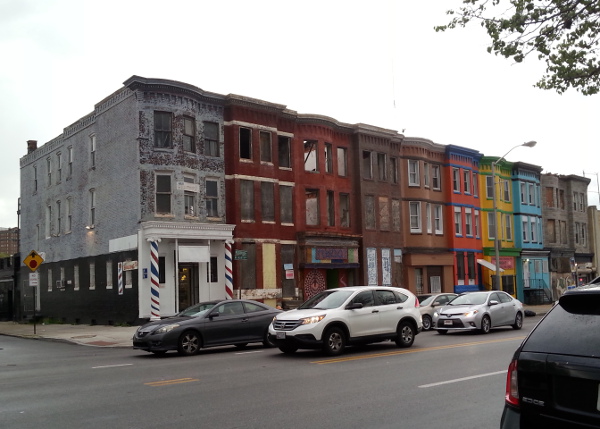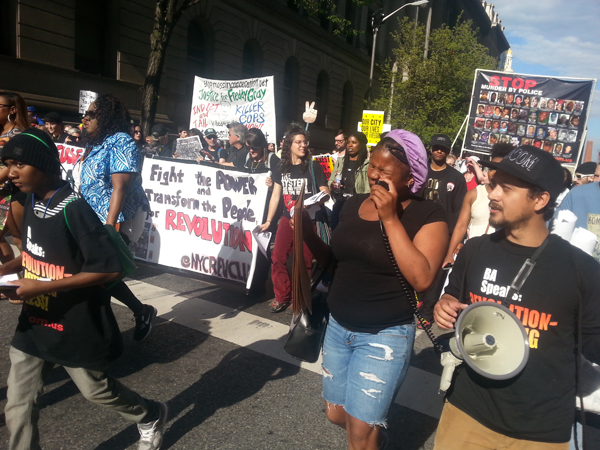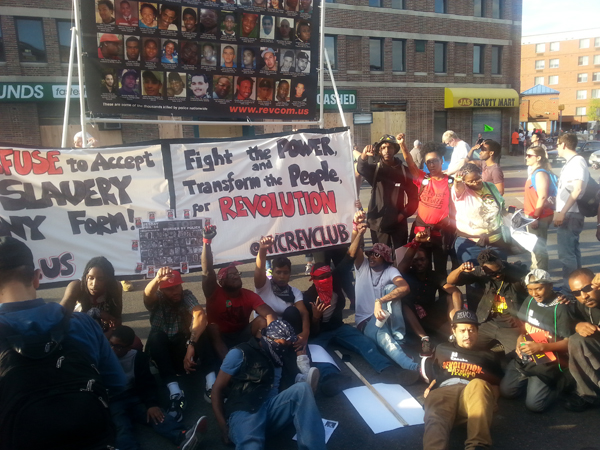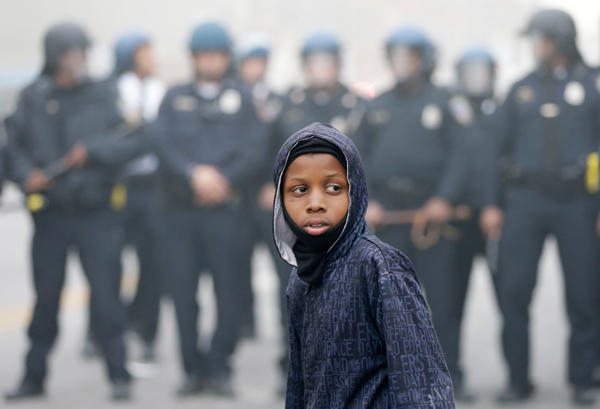Ever the lying statesman ( redundant?), obama is trying to find some sort of "middle ground" between the fucking murderers in blue, and the people who are fed the fuck up with pigs killing people. No dice, asshole. Kkkops are killing people, and people are increasingly rising up against this. but what do you expect from the king of the most murderous system and empire on earth?
Obama’s Three-Pronged Offensive: Fraud, Repression, and Sugar-Coated Poison
May 25, 2015 | Revolution Newspaper | revcom.us
Renewed and even more powerful upsurges against murder by police this spring have compelled Barack Obama to go on the offensive.
NOT against murder by police, but against the righteous struggle of the masses of people.
Obama has been very busy lately. One day he may be telling a gathering of cops how much he values their work, and how much this society depends on them. The next day he may speak to a group of college-bound inner-city youths and tell them he “understands” them, and wants to work with them to overcome their problems.
These efforts are not disjointed or disconnected. They are part of a full-court press intended to suppress growing rebellion and resistance among the basic people. They are intended to send a message broadly to society that “the system works” for those who work within it. They aim to isolate and marginalize people, among the basic masses as well as intellectuals and other middle class and well-off people who don’t “go along with the program.”
Obama’s offensive has three prongs. One, fraud. He is pushing programs he claims will help solve the problem of brutalizing, murdering police, but will actually do nothing of the kind. Two, repression. Obama is not only giving moral backing to the cops, he is pushing programs that step up police power OVER and AGAINST the masses of people. Three: sugar-coated poison. He is using words of concern and promises of money, designed to mislead, confuse, and derail the struggle of the people.
Losing Their Legitimacy
In December 2014, the Obama administration pulled together a task force to devise a plan for “21st Century Policing.” Earlier this month, shortly after the rebellion in Baltimore, the report of the plan was released. Obama stated that the plan’s aim is to promote “effective crime reduction while building public trust.” It calls for “improved community policing, community policing grants, body worn camera tool kits,” and other measures.
A central concern and focus of this report is that police across the country are losing or have lost legitimacy in the eyes of many people, especially Black and Latino people. The task force’s overriding goal is to “build trust and nurture legitimacy...” between the cops and the people they brutalize.
But what IS this “legitimacy” that they want to “nurture”?
The “legitimacy” of the police is the legitimacy to use force, including deadly force, under full protection of the law. Check out the Department of IN-justice report on the murder by a cop of Michael Brown in Ferguson, Missouri—towards the end it cites one court ruling after another in which U.S. law, based on the U.S. Constitution, legitimizes the police murdering unarmed people under all kinds of circumstances and with all kinds of “justifications.”
Ruben Garcia Villalpando, unarmed and with his hands in the air, was gunned down in cold blood by a pig in Grapevine, Texas. His killer was just no-billed (not indicted) by a Tarrant County grand jury. Marta Romero, Ruben’s wife, spoke poignantly about what the “legitimacy” of this system means. “If my husband had killed a police officer, he would be in jail. But since it was the opposite, will they just leave it this way? Because an officer killed a man, because he killed an illegal and nothing more? What are a human’s rights then? Now an animal gets more rights than a man.”
The police are enforcers of a system that has absolutely no future for the masses of youth. As Bob Avakian said, the police “enforce the conditions of poverty, misery and degradation into which the system has cast people and is determined to keep people in.” Nobody should accept those conditions, or the “legitimacy” of the people and institutions that enforce them. Unfortunately, however, most of the time people just accept it or take it for granted, because they think there’s no other way.
So it is a fine thing indeed—one of the best things to happen in this country in a long time—that courageous, defiant youths, from Ferguson, to New York, to Oakland, to Madison, and most definitely to Baltimore, as well as dozens of other cities, have challenged and begun to reject that legitimacy. It is a fine thing indeed that many people from better-off sections of society, including many white people, came out in the streets and in other ways have expressed support for those youths.
For Obama, and the system of capitalism-imperialism he represents and enforces, this is a problem. But for revolutionaries, and anyone who wants a better day, this is a GOOD thing—because revolution and liberation require that people no longer accept the right of the rulers to violently control them and are willing to challenge that. This battle of legitimacy is a big part of what Obama is trying to deal with here.
21st Century Policing
On the one hand, the Obama program for “21st century policing” wants to make a show of changing some of the most outrageous police practices. He calls for body cameras on cops—but cameras on the scene not only did not save Eric Garner, choked to death by a Staten Island, New York, pig on video, the DA didn’t even charge him, despite the evidence right there! Or Obama makes a big deal about halting the shipment to urban police forces of massive heavy weaponry used by the U.S. occupation armies against oppressed people all over the world.
But look more closely at what Obama said when he announced this program, and at what he did. “Law enforcement agencies should create policies and procedures for policing mass demonstrations ... to minimize the appearance of a military operation.” In other words, it’s fine torun a military operation against protests, just don’t have it appear like one. He also said: “We’ve seen how militarized gear can sometimes give people a feeling that it’s an occupying force.”
Obama’s directive is deceitful bullshit on an even more fundamental level. As the Washington Post reported, “most of the militarization [of police forces] takes place outside the 1033 Program [established in 1997 to transfer military hardware from the Department of Defense to local police departments]. ... Since 2003, for example, the Department of Homeland Security has been giving grants to police departments around the country to purchase new military gear. That program now dwarfs the 1033 program.” So Obama’s grand “directive,” as he surely knows, will have little effect on the ability of police forces to continue to obtain military weaponry.
This, and other measures like it, are part of the “fraud” part of the program—making people think that what he is doing will actually get to the essence of the problem and change things.
Look at the reality, and don’t go for the fraud. People in communities like Sandtown-Winchester in Baltimore and Ferguson, Missouri, feel like the cops are an occupying force because they are, and act like, an occupying force. Unarmed Akai Gurley was gunned down in the stairwell of a Brooklyn, New York, housing project by cops who didn’t even see him but had been trained to regard anyone there as an “enemy.” Beating people, arresting them for making eye contact, shooting them in cold blood, taking them for deadly “rough rides”―that’s how these pigs roll, it’s what they do. And when more is needed, they break out with tear gas, tanks, rifles, head-to-toe body armor, and more―and that’s exactly what an occupying army does.
Stepped Up Repression in The Name of “Trust”
The second part of Obama’s program is founded on increasing the intense repression of the police, and backing the police and their brutal, murderous activities to the hilt. This is why he has been making such a big point of speaking to police gatherings, of meeting with and declaring his support for police in places like Camden, New Jersey. Our article on Camden shows that they have turned that city into an open-air concentration camp—and THIS is what Obama wants to uphold and spread!!
This goes further, and again, we have to look beneath the surface. He calls for a big emphasis on building trust. And everywhere you turn, people are echoing this: “Oh, we need to restore trust” and “Oh, we’ve got to work together on this problem and restore trust.”
NO!!! The one thing that the oppressed do NOT need is trust for those who have been hired and trained to oppress them. Think about how absurd and idiotic this is. Would you say that the problem of slavery was that the enslaved people and the slave drivers didn’t trust each other? Would you say that the problem in the Nazi concentration camps was that the prisoners didn’t have enough trust for the guards? Would you say that the problem with the way white people took over America and committed genocide against the Native American Indians was that the Indians didn’t have trust for the whites? Then why in the world should anyone who wants liberation and freedom and justice want to build “trust” between an oppressed community and those who so viciously oppress them?
Obama hopes that “building trust” will demobilize people and get them back out of the streets. Sometimes you hear people say, “Well, I don’t like it when they brutalize people, but the one good thing they did was the Police Athletic League”—NO! The Police Athletic League and programs like that are designed to make people accept the brutality and murder as just the result of “bad people” and to not get that the police as an institution are designed to defend a system of oppression. Any “trust-building” is designed to cover over that and confuse people and puncture their militancy. This is why it was very righteous for a crowd at a recent town hall meeting of mainly Black people in Philadelphia to drive out the Black mayor and police chief of that city when they came to “listen to grievances” and “build trust” after they exonerated the cops who killed Brandon Tate-Brown last December. (Check out the video.)
And let’s be clear. Another big thing they are talking about when they say “let’s build trust” is building snitch networks. This is not only, or even mainly, about who’s doing crime. A lot of the time the police know who’s doing crime—and half the time they’re in on it. This is about informing.
Let’s go back to this question of legitimacy—of whether people think that the cops have a right to wield this force to defend the system. When and as their legitimacy comes into question, and as a movement for revolution develops, they will use this “trust” they have built—the snitch networks and all that—to try to destroy that movement.
This is not something we’re talking about 10 or 20 years down the road. As we have said, the current upsurge against police murder of Black and Latino people has changed things to the point where a real revolutionary situation could possibly develop out of the further unfolding of that, along with other developments. So there are very high stakes indeed in going up against this and tearing the covers off it.
Brother’s (Jail) Keeper
The third part of the Obama offensive is “sugar-coated poison.” Many middle class and well-off people are actually trying to find and develop ways to help inner-city youths whose lives are mangled by this wretched system. Many of them played positive roles in the big struggles that began in Ferguson last August.
Obama seeks to channel and (mis)direct those positive impulses and weave them into systems of control that reinforce and perpetuate the very system that spawns the problem. The Brother’s Keeper program, which Obama is reviving, is a cornerstone of this overall plan. It is a vital component of the way Obama is working to strengthen the system’s ability to repress the masses of people.
How can this be so? We’ve covered this in other articles, including in this issue, and we’ll have more to say in the future. But let’s say for the sake of argument that every single program in “Brother’s Keeper” actually helped young men (for the program is ONLY directed at males!) to be more educated and all that. There would still be no jobs!! There would still be the rank and pervasive discrimination built into every level of society—not just employment, but housing... credit... education... the criminal IN-justice system. There would still be the cultural demonization and dehumanization. This shit is just so much charity, and charity don’t change shit. It may help an individual here and there, but it doesn’t begin to get to the SOURCE of the problem. Charity cannot change that—charity cannot change the nature of this capitalist system, and the way that white supremacy is a vital part of its whole functioning. (See “On Obama’s 'My Brother’s Keeper' Speech.”)
People influenced by this need to ask themselves about the cost of participating. You can’t pick and choose—this is an integrated offensive, a whole program. You may think, for a while at least, that you are using the system to do good work; but what’s really going on is that the system intends to use you to facilitate its dirty work, to pacify the masses and continue its horrendous oppression, here and worldwide. As long as this system goes on—and especially in the particularly dangerous genocidal conditions of today—this is deadly.
Obama is not “changing.” He is not “finally beginning to do something.” He is doing precisely what he was brought into the presidency to do. He is fighting to demobilize and defuse the struggle of the Black masses in a way people like John McCain and Mitt Romney could never do. He is promoting the killing illusion that this system can be reformed, for Black people and for millions more who want to see an end to oppression and inequality. He is trying to restore people’s hope in something that really is completely hopeless. And to do that, he has been inviting people to the White House, pretending to listen intently to them, making them feel a part of things, like they have influence, like they and their concerns really do “matter”—and all the while, in doing so, getting them to tone down their critique and in fact to change their concerns, and in some cases, it seems, to go after those who won’t.
All this has to be seen through and rejected for what it is: an attempt to shore up faith in something that needs not faith but penetrating analysis and revolutionary overturning.
We NEED a Revolution
The Obama program for “21st Century Policing” is a program of viciously intensified, heavily militarized policing; extensive snitch networks; surveillance and spying everywhere; coupled with a few feeble “charitable” and educational programs for some inner-city youth. Even on the face of it, this is not even an attempt to address the underlying “social problems,” as Obama put it. It is an interwoven program of fraud, repression, and sugar-coated poison pills. It is, in fact, a program to strengthen the system’s ability—through its police, its jails, and its system of laws—to suppress, contain, and control a section of people for whom it has absolutely nothing to offer.
This 21st Century Policing will in fact contribute to the slow genocide of Black people, and position the system of capitalism-imperialism to hasten the pace of that genocide. It must be opposed. As we wrote last week in the article “High Stakes in Baltimore:” “This genocide has been and is being caused by a SYSTEM—capitalism-imperialism—and relying on charities or even talking about ‘structural change’ is meaningless and worse without the MAIN STRUCTURAL CHANGE that must happen: the radical overturning of this ruthless system of capitalism and white supremacy, through revolution, and its replacement by a whole new system in which the power is devoted to eliminating all oppression and exploitation, meeting the material needs of the people as it does so, and supporting revolution all over the world.
“And this gets back to the point: We NEED a revolution, we need to get organized for an ACTUAL revolution. What the masses have done in Baltimore has increased the possibility of that... and increased the challenges that revolutionaries must recognize and meet to actually move closer to being able to make that revolution.”

